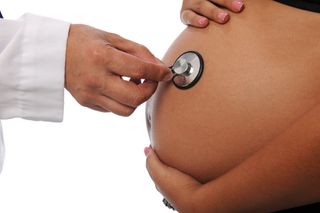Multiple Births Can Multiply Mom's Weight

Moms have often complained that the more children they have, the harder it becomes to shed the extra pounds gained during pregnancy, and a new mouse study may help explain why.
Researchers at the University of Cincinnati found that mouse moms who gave birth four times were 45 percent heavier than mouse moms who gave birth just once, despite eating similar amounts of food.
The findings suggest that in mice, as in humans, giving birth multiple times, regardless of age, can lead to weight gain and inflammation in the body, according to the researchers.
Moreover, the researchers identified specific metabolic changes in mothers and in offspring that are likely involved in obesity, the researchers said in a statement.
The study was published Jan. 26 in the American Journal of Physiology — Endocrinology and Metabolism.
Researchers engineered a type of mouse that mimics human moms who gain weight after multiple births. They compared mice that gave birth four times with mice that gave birth only once.
Researchers weighed the animals, assessed the size of their fat deposits, tested the mice to see how well their bodies controlled their blood sugar levels and measured their levels of inflammation.
Sign up for the Live Science daily newsletter now
Get the world’s most fascinating discoveries delivered straight to your inbox.
Study findings showed that mouse moms with multiple offspring had fat deposits several times larger than mouse moms with a single offspring. They also had larger blood sugar spikes after meals, a warning sign for diabetes.
Mouse moms with multiple offspring had higher levels of inflammation, compared with the mouse moms with a single offspring, as well as other moms who were given a high-fat diet. Elevated inflammation has been linked to heart disease, diabetes, cancer and a variety of other diseases.
Researchers performed similar tests in the male offspring of the mice.
They found that the male offspring of those who'd given birth multiple times weighed as much as 40 percent more than the male offspring of mouse moms with a single offspring, even though they didn’t eat more food.
The differences became apparent when the offspring were older, suggesting that excess energy was stored as fat only after their growth slowed down, according to the researchers.
When the researchers examined genes responsible for storing versus using fat, the multiple offspring animals appeared to use less fat compared to the single offspring animals.
The researchers said that effective ways to help women lose weight between pregnancies could help maintain their health, and that of their children.
Pass it on: Multiple births lead to extra pounds in mouse moms and male offspring.
Follow MyHealthNewsDaily on Twitter @MyHealth_MHND. Find us on Facebook.
